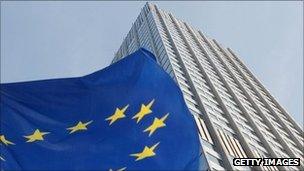German bailout vote: Merkel under fire from all sides
- Published
- comments

Germany's role at the heart of EU finance is in question
German Chancellor Angela Merkel is a cautious, thoughtful politician. She likes to lead from behind. She is rarely emotional, preferring to follow the logic of the facts. On Thursday she faces the most important vote since she became chancellor.
The German parliament will vote on increasing the powers of the EU's main bailout facility - the European Financial Stability Facility, external (EFSF). The fund will be able to extend credit lines to banks and will be able to buy bonds on the secondary market.
The idea is that it fights fires early when either countries or financial institutions are in danger in the eurozone. The EU is pinning its hopes on this facility bringing stability in the future. Eventually it will be subsumed into a permanent European Stability Mechanism in 2013.
Angela Merkel's problem is that within her coalition there are rebels who see this fund as paving the way towards Germany taking on more and more of the debts of other European nations. They question how this fund will be democratically controlled.
If the rebels number more than 19 then the chancellor will have to rely on the votes of the opposition to get the legislation through. That will be interpreted as weakening her authority.
Already the opposition are lining up to suggest that failure could result in early elections. The uncertainty of a German election would spook already stressed markets.
Dented authority
Thomas Oppermann, who is the leader of the Social Democrats' parliamentary group, said: "Many lawmakers understand that if she doesn't get a majority from her own ranks, then the end could come quickly for the government and that means an end to their mandates."
The vote, however, is not a vote of confidence and even if she has to rely on the opposition, it is most unlikely she will be forced into elections. But in Europe her authority will be seen to have been dented.
So much arm-twisting will take place. Potential rebels will be reminded that after a recent ruling by the constitutional court, parliament will have a bigger say in eurozone bailouts.
What is not being discussed, however, is that even while this measure goes through the German parliament, a plan is gaining ground to use the fund as a basis to borrow massive amounts of money - perhaps up to 2-3tn euros in order to help countries like Italy if they get into trouble.
Now the French prime minister has said that this new plan should only be discussed after the vote in the Bundestag. That will only increase the unease of members of the coalition, that their liabilities keep expanding.
Yesterday Chancellor Merkel again said that she would not allow the EU to become a debt union, where Europe's debts become common debt. "We won't do it," she said.
She warned that pushing for such a union might break solidarity. You could start out with a Triple A rating and end up with a Triple C, she said.
And yet the question will be asked, how can the firepower of the EFSF be increased without the taxpayer eventually having to pick up the tab if it all goes wrong?
Angela Merkel will continue to move cautiously, restricted by a German people increasingly opposed to bailouts. Her critics say that the European crisis is being driven by markets and that politicians have no coherent plan for the eurozone.
The German opposition say: "Europe's biggest economy should be taking a leading role. This is nowhere to be seen. Mrs Merkel is resisting leadership in Europe. It is just about retaining power in her own country."
Angela Merkel is pro-European. She believes that if the euro fails so does Europe. She accepts the need for greater discipline within the eurozone, for greater scrutiny of national budgets, for sanctions against those countries who break the rules, for a much closer coordination of tax and spending.
What she will not accept is eurobonds where the debt of all countries becomes the debt of the zone as a whole. Angela Merkel will not allow Germany to become the paymaster of Europe. The ultimate red line for Germany is that its own economy is not damaged by helping others.
It is worth noting, too, that the EFSF is outside EU treaties. It is based on inter-governmental treaties. What Germany does not want to do in fighting this crisis is give more power to the EU Commission.
Dangerous days
But all the time the pressure mounts for Germany to stand behind Europe's debt, to accept the logic of monetary union and accept much closer economic integration.
Today the President of the European Commission, Jose Manuel Barroso, was busy piling on the pressure. The EU, he said, was facing its biggest challenge in 50 years.
"We are confronted," he said, "by the greatest challenge the European Union has seen in its history."
"If we do not move forward with more unification we will suffer more fragmentation... I think this is going to be a baptism of fire for a whole generation."
So these are difficult and potentially dangerous days for the German chancellor. Under fire abroad, under attack from inside her own coalition, and under criticism from her own voters.